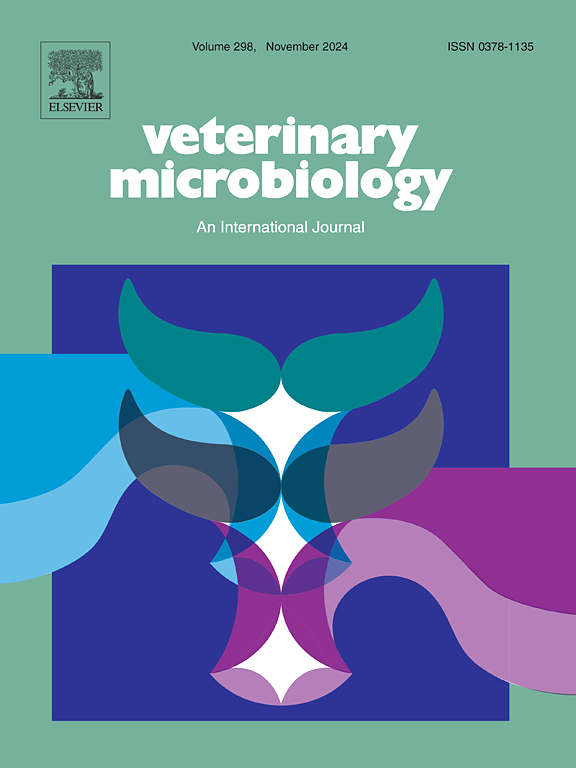A recombinant adenovirus-vectored PEDV vaccine co-expressing S1 and N proteins enhances mucosal immunity and confers protection in piglets
IF 2.4
2区 农林科学
Q3 MICROBIOLOGY
引用次数: 0
Abstract
Porcine epidemic diarrhea virus (PEDV) is a highly contagious enteric coronavirus that causes severe diarrhea and high mortality in neonatal piglets. Effective control requires systemic, mucosal, and T cell-mediated immune responses, highlighting the need for a safe, effective, and versatile vaccine platform. In this study, a recombinant adenovirus type 5-based vaccine co-expressing the PEDV S1 and N proteins (rAd5-S1-N) was developed, and its immunogenicity and protective efficacy were evaluated in mice and piglets. Intranasal immunization of BALB/c mice with rAd5-S1-N induced strong and sustained mucosal and systemic responses, with S1-specific IgA detected in both mucosal tissues and serum up to 12 weeks post-immunization. Systemic IgG responses were also robust via intramuscular, intranasal, and intraperitoneal routes, with geometric mean titers reaching ∼ by week 4 and remaining stable through week 12. In piglets, immunization via the houhai acupoint elicited significantly stronger humoral and cellular responses than the intramuscular route, as evidenced by a 3.6- to 4.1-fold increase in S1- and N-specific IFN-γ–secreting T cells. Both immunization routes induced durable S1-specific IgG responses that remained stable for at least 11 weeks. Importantly, rAd5-S1-N conferred protection in actively immunized piglets against high-dose oral PEDV challenge (2 × ), and provided passive protection to neonatal piglets via colostrum antibodies after sow immunization, as indicated by reduced viral shedding, shortened diarrhea duration, milder intestinal lesions, and improved weight gain. These findings demonstrate the potential of rAd5-S1-N as a promising vaccine candidate for effective PEDV prevention in swine.
一种共表达S1蛋白和N蛋白的重组腺病毒载体PEDV疫苗增强了仔猪的黏膜免疫并具有保护作用
猪流行性腹泻病毒(PEDV)是一种高传染性的肠道冠状病毒,可引起新生儿仔猪严重腹泻和高死亡率。有效的控制需要全身、粘膜和T细胞介导的免疫反应,强调需要一个安全、有效和通用的疫苗平台。本研究研制了一种重组腺病毒5型疫苗,共表达PEDV S1和N蛋白(rAd5-S1-N),并在小鼠和仔猪上评价了其免疫原性和保护效果。用rAd5-S1-N鼻内免疫BALB/c小鼠可诱导强烈且持续的粘膜和全身反应,免疫后12周在粘膜组织和血清中均检测到s1特异性IgA。通过肌肉、鼻内和腹腔注射途径,全身IgG反应也很强劲,几何平均滴度在第4周达到104,并在第12周保持稳定。在仔猪中,后海穴免疫引起的体液和细胞反应明显强于肌内免疫,S1和n特异性IFN-γ分泌T细胞增加3.6- 4.1倍。两种免疫途径都诱导了持久的s1特异性IgG反应,至少保持稳定11周。重要的是,rAd5-S1-N在主动免疫仔猪中对高剂量口服PEDV攻击(2 × 105TCID50)具有保护作用,并且在母猪免疫后通过初乳抗体对新生仔猪提供被动保护,这表明病毒脱落减少,腹泻持续时间缩短,肠道病变减轻,体重增加。这些发现证明了rAd5-S1-N作为猪PEDV有效预防的候选疫苗的潜力。
本文章由计算机程序翻译,如有差异,请以英文原文为准。
求助全文
约1分钟内获得全文
求助全文
来源期刊

Veterinary microbiology
农林科学-兽医学
CiteScore
5.90
自引率
6.10%
发文量
221
审稿时长
52 days
期刊介绍:
Veterinary Microbiology is concerned with microbial (bacterial, fungal, viral) diseases of domesticated vertebrate animals (livestock, companion animals, fur-bearing animals, game, poultry, fish) that supply food, other useful products or companionship. In addition, Microbial diseases of wild animals living in captivity, or as members of the feral fauna will also be considered if the infections are of interest because of their interrelation with humans (zoonoses) and/or domestic animals. Studies of antimicrobial resistance are also included, provided that the results represent a substantial advance in knowledge. Authors are strongly encouraged to read - prior to submission - the Editorials (''Scope or cope'' and ''Scope or cope II'') published previously in the journal. The Editors reserve the right to suggest submission to another journal for those papers which they feel would be more appropriate for consideration by that journal.
Original research papers of high quality and novelty on aspects of control, host response, molecular biology, pathogenesis, prevention, and treatment of microbial diseases of animals are published. Papers dealing primarily with immunology, epidemiology, molecular biology and antiviral or microbial agents will only be considered if they demonstrate a clear impact on a disease. Papers focusing solely on diagnostic techniques (such as another PCR protocol or ELISA) will not be published - focus should be on a microorganism and not on a particular technique. Papers only reporting microbial sequences, transcriptomics data, or proteomics data will not be considered unless the results represent a substantial advance in knowledge.
Drug trial papers will be considered if they have general application or significance. Papers on the identification of microorganisms will also be considered, but detailed taxonomic studies do not fall within the scope of the journal. Case reports will not be published, unless they have general application or contain novel aspects. Papers of geographically limited interest, which repeat what had been established elsewhere will not be considered. The readership of the journal is global.
 求助内容:
求助内容: 应助结果提醒方式:
应助结果提醒方式:


